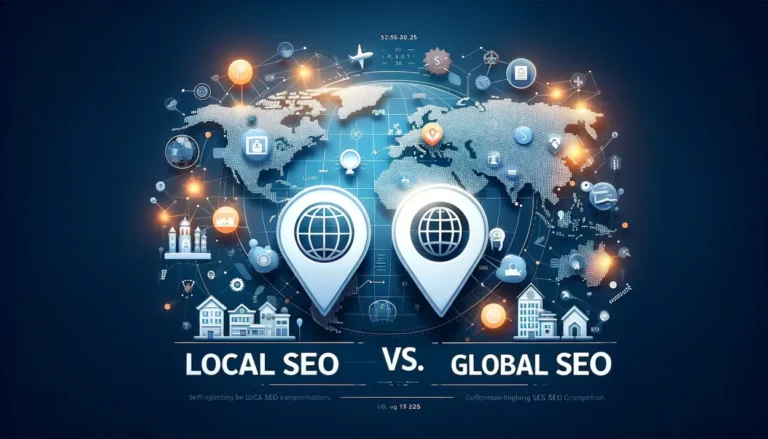In the bustling digital marketplace, content marketing emerges as the beacon that guides search engines to the treasures of a website. It’s the artful weaving of narratives and the strategic placement of words that act as magnets, drawing the curious eyes of algorithms and humans alike. Imagine a tapestry of engaging blog posts, insightful articles, and captivating videos, all intricately stitched with keywords that resonate with the audience’s deepest queries. This rich tapestry not only captivates the audience but also charms the ever-evolving search engine crawlers that are on a perpetual quest to index the most relevant and valuable content.
As dawn breaks on the horizon of the internet each day, content marketing stands like a lighthouse, sending signals in the form of optimized content across the vast ocean of information. These signals reach far and wide, catching the attention of search engines that reward the clarity and relevance of such content with higher rankings. Each piece of content is akin to a beacon of knowledge, illuminating the path for seekers of solutions and information.
Understanding the Power of Quality Content in SEO
In the bustling digital marketplace, the allure of unique content cannot be overstated; it serves as the lifeblood of SEO. Engaging quality content, woven with originality and relevance, attracts the discerning eye of both users and search engines. To craft high-quality content, one must blend creativity with strategic keyword placement, ensuring each piece is an intricate tapestry of information and style.
As the quest for fresh content continues, the garden of SEO blooms with new content, each piece a seedling of potential, waiting to sprout into the best place on search rankings.
The Importance of Unique and Fresh Content
Sailing smoothly from the harbor of introductory ideas, let us dive into the vibrant ocean of quality content and its undeniable importance in the SEO universe. Picture a library where every book brims with stories never told before; this is the essence of unique content on the web. It’s not just a matter of standing out in a crowded market; unique content acts as a beacon, guiding search engines to the treasure trove of your website.
Quality content doesn’t just cling to relevance; it dances with creativity, offering new perspectives that captivate and engage. It is the heartbeat of a website, pumping new content into the veins of the internet, ensuring that the digital world remains pulsating with life. Each piece of highquality content is a brushstroke on the canvas of the web, painting a picture that is both enlightening and enthralling.
The creation of substantial content is akin to planting a garden that blooms all year round, with helpful content being the nourishment that keeps it flourishing.
How to Craft High-Quality Content for Better SEO
Embarking on the journey to infuse your SEO strategy with a touch of excellence, the secret lies in the artistry of creating high-quality content. Imagine a canvas where every stroke of your keyword-rich prose adds depth and dimension, drawing in readers and search engines alike. To craft this masterpiece, begin with a foundation of well-researched topics that resonate with your audience’s queries and interests.
Envision weaving in compelling narratives that captivate, with every paragraph structured to guide visitors through a seamless flow of information. The incorporation of new content brimming with relevance ensures that the thirst for knowledge is quenched, while also signaling search engines that your site is a fountain of up-to-date wisdom.
In the pursuit of highquality content, remember that clarity is king; a clear, engaging voice will echo in the halls of digital libraries, beckoning curious minds. Helpful content not only answers questions but also sparks curiosity, encouraging longer stays and deeper dives into your site’s offerings.
The Role of Helpful, Substantial Content in SEO Ranking
Transitioning smoothly from the previous discussion, it is essential to illuminate the pivotal role that informative and significant material plays in the realm of SEO rankings. Picture a library brimming with books, each filled with comprehensive knowledge tailored to enlighten and engage the reader. In the digital landscape, websites that act as such libraries—stocked with thorough and insightful reading—are favored by search engines. The art of constructing content that stands as a beacon of resourcefulness and depth cannot be overstated; it involves weaving a tapestry of facts, figures, and narratives that not only captivate but also educate the audience.
The compass for navigating the SEO rankings often points towards the richness of the material presented. Envision content that serves as a masterclass—informing, solving dilemmas, and enriching the reader’s understanding. This kind of material, embedded with the essence of expertise and reliability, signals to search engines that a website is a fount of knowledge, worthy of a higher berth in the search results.
The Direct Connection Between SEO and Content
SEO content acts as the beacon that guides online visibility through the bustling digital marketplace. Within this landscape, the role of SEO services becomes indispensable, meticulously optimizing online content to resonate with both search engines and human curiosity alike. As architects of visibility, these services sculpt content SEO strategies that ensure a website’s offerings emerge from the shadows of obscurity, harnessing keyword opportunities to connect with seeking minds.
The leverage of SEO tools unfolds the map to untapped potential, revealing the SEO benefits woven into the fabric of content marketing. Imagine a tapestry of words, each thread selected by SEO tools to form a picture that captivates and educates.
How SEO Content Drives Online Visibility
As we meander through the vibrant garden of digital marketing, it’s clear that the lush foliage of SEO content acts as a beacon, guiding the curious eyes of internet explorers to your website’s doorstep. Imagine a bustling bazaar where every stall vies for attention; SEO content is the alluring aroma that draws visitors from the crowded pathways of the internet straight to your display.
SEO content serves as a lighthouse in the boundless ocean of information, its light cutting through the digital fog to illuminate your website’s presence. It’s the meticulously woven tapestry of words, each thread an opportunity to engage with audiences and search engines alike. In the grand tapestry of the web, content SEO stitches your narrative into the fabric of online searches, ensuring that when the winds of queries blow, your site sails toward the top of SERPs.
SEO services play the role of skilled gardeners, nurturing the organic growth of your website’s visibility by infusing SEO content with the right nutrients—keywords that resonate with the audience’s search intent.
The Role of SEO Services in Content Optimization
As the curtain falls on the importance of well-crafted material for search engine optimization, a spotlight shines on the intricate dance between SEO services and content optimization—a performance where precision meets creativity. Imagine a bustling marketplace on November 29, where every booth vies for attention; SEO services act as the master strategists that ensure your booth not only attracts the crowd but also engages them thoroughly.
The artisans of SEO services meticulously analyze and enhance the architecture of your digital presence, ensuring that every word, every headline, and every meta description is a stepping stone towards greater online visibility. With their guidance, the content SEO becomes a beacon, signaling search engines to take notice. At gatherings like WordCamp Ahmedabad, whispered conversations between web developers and content strategists buzz with anecdotes of how SEO services have transformed obscure pages into pillars of information that stand tall in search results.
SEO services weave the delicate threads of technical optimization with the vibrant tapestry of content SEO, creating a masterpiece visible from afar.
Understanding the Benefits of SEO Tools in Content Marketing
As if by magic, the realm of digital marketing unfurls a vibrant tapestry where SEO and content dance in harmony. Understanding the Benefits of SEO Tools in Content Marketing unveils a path where visibility in the bustling online marketplace is not just a dream, but a tangible reality. Imagine a landscape where content SEO becomes a beacon, guiding the myriad of internet users straight to the treasure trove of information they seek. This is the pivotal role that SEO instruments play in sculpting and polishing the message until it shines brightly across search engines.
SEO services, adept in the art of optimization, employ these tools with a craftsman’s precision, ensuring that every piece of content SEO not only reaches its audience but resonates with them. The SEO benefits of such fine-tuning are manifold; from elevating traffic to enhancing engagement, the impact is profound.
The Need for Continual Content Production in SEO
In the digital garden of the web, content strategies serve as the blueprint for a flourishing presence, guiding the growth of visibility through the rich soil of search engines. Content marketers, like nurturing gardeners, tend to this landscape, sowing seeds of information that blossom into search-engine recognition. Their influence on SEO results is akin to sunlight on petals, turning the gears of rankings with every article, blog, and video produced. The art of content creation, however, is not a uniform field—major differences in approaches yield a tapestry of textual hues, each piece tailored to captivate and engage.
The Role of Content Strategies in SEO
As the digital landscape flourishes, the tapestry of Search Engine Optimization becomes increasingly intricate, with content strategy as its vibrant thread. In the grand scheme of SEO, content strategy weaves together the myriad of elements that search engines scrutinize. It is the astute content marketer who orchestrates this symphony, ensuring that each piece of content creation harmonizes with the overarching objectives of visibility and engagement.
The role of content strategy in SEO is akin to that of a master gardener, where the content marketer meticulously cultivates a diverse garden of articles, blogs, and multimedia. This garden is not grown in haphazard bursts but is carefully planned with a mix of evergreen topics and trending subjects that promise a greater ROI through sustained organic search presence.
Content creation is not a one-time affair; rather it is a continuous endeavor. A content marketer knows the value of planting seeds of free content that will bear fruit over time, attracting a steady stream of visitors.
How Content Marketers Influence SEO Results
As we traverse the digital landscape, the tireless endeavors of content artisans become ever more apparent in shaping the terrain of search engine results. These creators, with their strategic deployment of words and multimedia, wield the power to steer the visibility of websites amidst the vast ocean of online information.
By meticulously researching topics, trends, and audience preferences, these architects of information construct articles, blog posts, and videos that resonate deeply with curious minds. They engage in a delicate dance with search engine algorithms, embedding thoughtfully selected phrases that act as beacons, guiding internet explorers to the shores of their domains.
The influence of these dedicated professionals extends beyond mere creation; they are the gardeners who tend to the ever-growing forest of digital information, pruning outdated materials and sowing seeds for future blossoms of insight. Their continuous efforts ensure that the digital garden remains a vibrant ecosystem, abuzz with the latest knowledge, ripe for discovery.
The Major Differences In Content Creation Approaches
Picture a garden where each flower represents a different approach to nurturing the digital landscape. Here, the art of cultivating engaging articles, blogs, and videos diverges like the many-hued petals of these flowers, each with its own character and charm.
On one side of the garden, the methodical planting of evergreen pieces promises a long-lasting allure, drawing in visitors with timeless information that remains relevant season after season. In another corner, the spontaneous bursts of topical blooms capitalize on trending topics, creating a buzz with their immediate relevance and timely insights.
Elsewhere, the careful grafting of educational material onto storytelling branches yields a delightful hybrid that both informs and entertains, tapping into the narrative hunger of the audience. And not to be overlooked, the interactive installations that invite passersby to engage, like puzzles waiting to be solved, fostering a sense of community and participation in the knowledge feast.
Google’s Preference for Longer, High-Quality Content
In the lush garden of digital information, Google prefers longer content, nurturing a haven where thorough and informative pieces flourish. This preference is a beacon, guiding the flow of relevant traffic like streams meandering toward an open sea. As algorithms evolve with new rankings and updates, the landscape of SEO transforms, affecting how website visitors discover and engage with webpages. The intersection of website traffic and content quality becomes ever more critical, painting a vivid picture where depth and richness in articles serve as magnets for relevant traffic. The website traffic conclusion is clear: attracting an audience is intertwined with creating detailed, captivating narratives.
Driving Relevant Traffic Through Content Marketing
As we segue from the necessity of consistent content generation, let’s illuminate the pathway to captivating the right audience through content marketing. Imagine a bustling digital marketplace where every click is a potential customer and every article, a beacon guiding them to your virtual doorstep. Content marketing is the art of crafting informative and engaging articles that resonate with the curiosity and needs of your audience.
In this realm, it’s not just about throwing words onto a page; it’s about weaving a tapestry of information that entices and informs. The secret lies in creating a symphony of words that dances across the screen, leading visitors on a journey that satisfies their quest for knowledge and gently nudges them towards your offerings.
Amidst this, new updates in search algorithms are the currents that can swiftly change the course of this journey. Mastering content marketing ensures your vessel is not only seaworthy but also capable of catching the right winds, driving a steady stream of intrigued visitors to your website’s shores.
How New Rankings and Updates Impact SEO
As the digital landscape flourishes, search engine algorithms evolve, unfurling a tapestry of challenges and opportunities in their wake. The shifting sands of these algorithmic updates cast a profound influence on the art of optimizing search engine visibility. A timely tweak in the algorithms can reconfigure the leaderboard of search results, turning the spotlight onto different players almost overnight.
Understanding these algorithmic changes becomes a pursuit akin to deciphering a complex puzzle, where each piece represents a potential for a surge or dip in visibility. Webmasters must remain vigilant, for even a minute alteration could pivot the direction of their digital journey, necessitating adjustments to their optimization tactics.
In this dynamic environment, the synthesis of engaging and informative narratives becomes paramount. A site’s ability to climb the rankings is intricately linked to its agility in adapting to these updates. By staying abreast of these changes and tailoring strategies accordingly, webmasters can navigate through the ebbs and flows of search engine preferences, ensuring their sites remain in the embrace of the coveted first-page listings.
The Intersection of Website Traffic and Content Quality
As the digital landscape blossoms, the fusion of web traffic and the caliber of articles and information presented on websites becomes increasingly critical. Imagine a bustling marketplace where each stall brims with vibrant, enticing goods, drawing visitors from near and far. This marketplace thrives not merely on the frequency of new displays but predominantly on the allure and value of the merchandise offered.
In the realm of search engine optimization, the thoroughfare of virtual footfall to a website is intimately tied to the richness and informational depth of its content offerings. A website adorned with engaging and meticulously researched pieces becomes a beacon for curious minds, much like an art gallery where each new exhibition promises a feast for the senses. The correlation is clear: a steady stream of intrigued visitors is not simply about the volume of articles; it’s about captivating their intellect, satisfying their informational cravings, and leaving them yearning for more.

How Content Marketing Contributes to Revenue Acceleration
Imagine a bustling marketplace where the stalls are various content marketing channels, each offering a pathway to enhance a revenue acceleration platform. Like a tapestry woven from threads of multiple channels, a robust content strategy envelops potential customers in an immersive experience, accelerating the journey from awareness to conversion.
The air buzzes with the energy of brand awareness campaigns, their vibrant colors painting a story that resonates with passersby. This visual symphony elevates a brand into the collective consciousness, becoming a beacon that guides revenue growth.
Amidst this dynamic setting, realistic planning stands as the cornerstone of sustainability.
The Role of Multiple Channels in Content Marketing
As the digital tapestry continues to unfurl, it becomes clear that a revenue acceleration platform thrives on weaving its narrative through a myriad of avenues. Imagine a garden where each path leads to a unique spectacle of blooms and vistas; this is the role of diverse channels in content marketing. Each pathway—be it social media streams, email campaigns, blog posts, or webinars—offers a colorful journey for the audience, leaving a distinct impression and an invitation to explore further.
Employing different channels is akin to casting a wider net into the sea of potential clients, each strand tailored to catch attention in its own special way. It’s a symphony of voices, where every instrument plays a crucial role in the harmony of brand awareness, resonating with different segments of the audience. The melodic outreach across platforms ensures that the message not only echoes but also amplifies through the chambers of the digital marketplace, setting the stage for a crescendo of engagement and, ultimately, a boost in revenue.
Building Brand Awareness Through Content Marketing
As we pivot from the canvas of lengthy, informative compositions favored by search engines, let’s explore how the vibrant tapestry of content marketing weaves a story that elevates brand recognition. Imagine a marketplace bustling with voices, each clamoring to be heard. In this cacophony, content marketing emerges as a beacon, guiding the curious towards a brand’s welcoming embrace.
Through compelling narratives, educational articles, and evocative visuals, companies can imprint their identity in the minds of consumers. Each piece of content acts like a thread, dyed in the hues of the brand’s values and vision, interlacing to form a memorable image. Engaging tales shared across blogs, videos, and social media platforms capture imaginations, fostering a sense of familiarity and trust.
The symphony of strategic storytelling resonates with audiences, leaving an indelible mark that transforms passersby into passionate advocates.
The Benefits of Realistic Planning in Content Marketing
As we turn the page from understanding the intricacies of crafting extensive and informative articles, let’s delve into another crucial aspect of content marketing that can significantly impact revenue growth: the art of meticulous and achievable planning. Imagine a garden, where each plant’s potential is maximized when the gardener knows the precise season to sow, the perfect depth for planting, and the optimal care schedule. Similarly, in content marketing, the blueprint for success involves a detailed and feasible plan that outlines the roadmap for content dissemination.
This strategic planning ensures that every piece of content has a clear purpose and fits neatly into the broader tapestry of the marketing calendar. By anticipating market trends, customer needs, and allocating resources judiciously, the seeds of future profits are sown. This pragmatic approach to planning allows for a buffer against unforeseen obstacles, ensuring that content campaigns blossom even when faced with industry headwinds.
The benefits of such planning are manifold: it streamlines the production process, aligns team efforts towards common goals, and provides a clear measure of progress against benchmarks.
Understanding the Importance of SEO in Dental Marketing
Navigating the intricacies of dental marketing, the power of Dental SEO emerges as a beacon, guiding potential patients through the digital landscape to the welcoming doors of dental practices. As the gears of SEO Dental SEO turn, they churn a pathway for visibility and engagement. Diving deeper, the infusion of Related Topics Content SEO weaves a tapestry of interconnected themes, enhancing the lure of dental websites with a rich array of related resources that beckon to curious seekers. This strategic alignment of SEO & Keywords crafts a digital mosaic that captures attention and retains interest.
The Impact of SEO on Dental Services
As we bridge the gap from revenue acceleration through content marketing, it’s time to shine a spotlight on another powerful player in the digital marketing arena: Search Engine Optimization, or SEO. This strategic ally in your promotional arsenal can significantly boost the visibility of dental practices online.
Imagine a world where your dental clinic surfaces at the top of search engine results, standing out like a beacon to potential patients scouring the internet for their next dental appointment. That’s the profound impact of SEO on dental services. It’s not just about being seen—it’s about being seen by the right eyes at the right time. When your website climbs the ranks in search results, it’s like planting your practice on the busiest street in town, digitally speaking.
SEO results are the milestones marking your practice’s journey to the forefront of patient’s minds. With meticulous refinement of website elements and a keen understanding of what your audience seeks, SEO casts a net wide enough to capture those looking for everything from routine cleanings to cosmetic dentistry.
How Related Topics Enhance SEO in Dental Services
As we pivot from the realm of content marketing into the intricate dance of search engine optimization, it’s essential to shed light on how a diverse array of subjects can elevate dental practices into the spotlight of search engines. Imagine a mosaic of articles, each tile representing a nuanced topic related to dental health and services. This kaleidoscope of subjects, when interlinked and thoughtfully arranged, not only draws the curiosity of readers but also catches the keen eye of search algorithms.
In the intricate web of SEO, the fusion of various dental-related themes plays a pivotal role in propelling a website’s visibility. Envision an online tapestry where threads of information on teeth whitening interweave with the latest advancements in orthodontics, and discussions on preventive care merge seamlessly with insights on pediatric dentistry. This symphony of related topics creates a rich tapestry that not only informs but also engages a diversified audience.
By covering a spectrum of interconnected subjects, dental practices can cast a wider net to capture the attention of individuals with varying dental inquiries and concerns.
The Role of SEO Results in Dental Marketing
Navigating from the bustling highways of content marketing, let’s anchor at the bustling intersection where Search Engine Optimization (SEO) plays a pivotal role in the bustling world of dental marketing. As the gears of the digital landscape turn, the influence of SEO on a dental practice’s visibility becomes increasingly clear.
In dental marketing, the triumph of SEO efforts is akin to a lighthouse guiding potential patients to the shores of a dental practice’s website. Through meticulous optimization, a dental website can climb the ranks of search engine results, beaming like a beacon to those in search of oral health services. The higher a website ascends, the more likely it is to catch the eye of prospective clients, leading to an uptick in appointments and, ultimately, a boost in revenue generation.
This pivotal role of SEO in dental marketing is not just about being seen; it’s about being seen by the right eyes. Tailored SEO strategies ensure that a dental practice emerges at the forefront when individuals actively seek dental solutions, effectively bridging the gap between a practice and its future clientele.
The Importance of Content Marketing in Niche Industries
In the tapestry of niche markets, the all-in-one CRM platform emerges as a linchpin, weaving together the threads of content marketing to tailor a seamless customer journey. As this tool orchestrates the symphony of data and outreach, it illuminates the path to engaging narratives that resonate with specific audiences.
Yet, the power of such tales lies in their clarity. A simple message, crisp and uncluttered, cuts through the noise like a beacon, guiding potential customers with an understanding that fosters trust and connection.
With trust as the cornerstone, content marketing becomes a catalyst, transforming browsers into buyers and nurturing the growth of organic transactions.
How the All-in-One CRM Platform Supports Content Marketing
Just as a well-orchestrated symphony captivates its audience, the harmonious integration of content marketing with an allinone crm platform can enchant potential customers and lead them through a journey from awareness to loyalty. Envision a tool that acts as the conductor, effortlessly coordinating each section of your marketing orchestra: from the strings of customer data to the brass of audience engagement.
The allinone crm platform orchestrates this symphony by providing a centralized hub where every note of customer interaction is composed, stored, and analyzed. It empowers marketers to tune into the fine details of their audience’s behaviors and preferences, turning these insights into beautifully crafted campaigns that resonate with each unique listener.
By segmenting audiences based on detailed analytics, the platform ensures that the messaging strikes the right chord with the right people at the perfect moment. It keeps the rhythm of commerce sales pulsing by streamlining processes, aligning sales and marketing efforts, and automating tasks that otherwise consume precious creative time.
The Advantage of Simple, Clear Messaging in Content Marketing
As we navigate away from the foundational elements of SEO in the realm of dental marketing, a spotlight now shines upon the compelling necessity for clarity and directness in content messaging, particularly within niche markets. Imagine a beacon of information, guiding potential customers through a sea of industry jargon and technicalities with the warmth of straightforward language. This beacon, in the form of clear and accessible communication, beckons to the audience, promising an understanding that pierces through the fog of complexity.
In the art of content marketing, the power lies in the ability to distill intricate concepts into digestible morsels that resonate with the audience. The advantage is unmistakable: messages that are crisp and devoid of unnecessary embellishments not only captivate but also retain the attention of readers, allowing for key points to shine like beacons in the night. Such lucidity in messaging fosters a connection that blooms into trust, setting the stage for a loyal following and sustained engagement.
Boosting eCommerce Sales Through Content Marketing
Bridging the gap from search engine optimization to the art of digital salesmanship, content marketing emerges as the driving force in propelling eCommerce revenue. Imagine a bustling digital marketplace where vivid descriptions and compelling narratives transform passive browsers into eager purchasers. This transformation hinges on the strategic dissemination of engaging material that resonates with the desires and needs of the consumer.
In the realm of eCommerce, content marketing flourishes as an indispensable catalyst, boosting transactional activity through a blend of storytelling, education, and persuasive calls-to-action. Envision product pages not just as mere lists of features, but as canvases where each brushstroke contributes to a masterpiece that appeals to the senses and emotions of the shopper. Here, evocative product tales are spun, weaving the practicalities of an item with the aspirations it fulfills.
Through cleverly engineered blog posts, immersive video content, and interactive social media campaigns, an eCommerce platform becomes more than just a storefront; it turns into a destination that customers trust and revisit.
Conclusion
In the dynamic dance of search engine optimization, the weave of compelling narratives stands as a beacon, guiding the digital traveler through the vast expanse of the internet. The interplay between meticulously structured articles and the algorithms that favor comprehensive explorations of topics illuminates the path to visibility and connection.
As the digital landscape thrives on the dissemination of engaging and informative reads, industries from dental practices to specialized sectors discover the golden threads that bind effective communication with robust growth. This synergy fuels not only the engines of discovery but also the engines of commerce, cultivating fertile ground for businesses to flourish in an ever-evolving online ecosystem.






